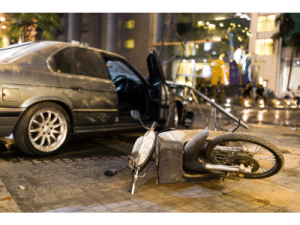DUI Accident
People become frightened after being involved in a car accident. Some would escape the collision site while others would remain at the scene in this state. Not everyone among those who stay behind understands what to do in the event of a collision. Getting the help of an experienced DUI attorney to agree to assist you is critical to ensure that you do not breach Idaho laws and jeopardize your injury claim.
The first step after a DUI accident is to read through the police report for the accident. You may be a bit confused in the aftermath. Did the at-fault driver take a breathalyzer test? Did they state that they were under the influence? That is why you must not release any sensitive or confidential information unless you are advised to do so.
Whether the police officer cited the at-fault driver for DUI or not will not be crucial in your claim. Even though the officer did not mention the at-fault party, the police officer’s report is essential.

Possible Punitive Damages in a DUI Case
According to Civil Code Section 3294, a convicted criminal may seek punitive or exemplary damages. Besides the usual damages: Punitive damages and exemplary damages serve as punishments and deterrents against similar behavior in the future.
Defendants can face criminal charges where they commit an act of oppression, fraud, or omission. The court in Idaho has already made clear that it is a gray area for DUI cases and that some DUI cases involve accidents that can be awarded as punitive damages.
What to do After a Drunk Driving Accident
All parties must assist with the police investigation in a drunk driving accident. Law enforcement has received specialized training to find evidence, question witnesses, and evaluate whether or not the at-fault motorist was under the influence of alcohol or drugs. For the former, they will do field sobriety tests, administer a breathalyzer test, and get a driver’s blood or urine sample.
The tests are critical because you would be unable to file a drunk driving case against the individual who caused the accident without them. It would also have an impact on your compensation, as the court may refuse to award you punitive damages if you file a personal injury claim. Consequently, cooperate with the authorities and honestly answer all of their queries.
As a drunk driver, resist accepting responsibility until you have spoken with a DUI attorney. Saying sorry at the scene of an accident is inappropriate, so please refrain from doing so. Keep in mind that DUI charges are considered criminal offenses, and whatever you say or do while under the influence of alcohol may and could be used against you in court.
What Happens if I Refuse a Drug Test?
Upon detecting illegal alcohol in the driver’s body, the officer will ask the motorist to submit a blood alcohol content or urine sample for drug testing. The policeman will even look for drugs in the vehicle. Although drivers cannot refuse to take such tests, this is not advisable.
By consenting to drive on Idaho’s roadways, you provide your agreement to be examined for driving under the influence. If a police officer pulls you over on suspicion of DUI, they have the right to request that you submit to the tests. In addition, you have the right to say no to them. The repercussions of your actions, on the other hand, will be severe.
If you refuse to take a field sobriety test or a breathalyzer test, you will be subject to harsh penalties. You will face a fine of $250, and your driver’s license will be suspended for one year if you are found guilty. They will subject you to these penalties regardless of whether you are convicted of DUI or not.
Prior Alcohol-Related Offenses
You may be arrested for an alcohol-related violation in municipal or district court, or you may have committed an alcohol-related offense without actually drinking and driving. Your record can take seven to 10 years to clear in either case. Before deciding which one is right for you, research your options.
The consequences of a DUI conviction are steep. Even a first-time infraction without injury is a misdemeanor. However, an offense involving injury is often classified as a felony. Depending on the severity of the injury, the charge can be higher than a misdemeanor. For example, you may be charged with homicide or manslaughter.
This charge doesn’t require proof of intentional killing, and you could have simply been driving while intoxicated.
Are Drunk Drivers Automatically at Fault?
As a driver, you have a duty of reasonable care, which means you must use caution when driving. The burden of establishing a causal connection between your failure to exercise reasonable care and the losses arising from the automobile collision falls on you in cases where you have committed or failed to commit an act that was thoughtless and irresponsible on your part. It suggests that you were negligent in your performance of your duty of care.
If a judge finds you guilty of driving under the influence in Idaho, you may face a prison sentence of up to 6 months and fines of up to $500, among other penalties. The court can suspend your driver’s license for more than six months, as well as the installation of an ignition lock device in your vehicle.
The Process Immediately after a DUI Accident
 As in many auto accidents cases, law enforcement arrives at the scene and documents the incident. This could include hearing testimony, assessment of damage to the automobile, if necessary.
As in many auto accidents cases, law enforcement arrives at the scene and documents the incident. This could include hearing testimony, assessment of damage to the automobile, if necessary.
Upon the arrest of someone in an accident, the police can cite evidence of intoxication and may have the driver undergo the tests outlined below. Upon these tests, the police can arrest the motorist.
Can I face a Murder Charge?
A drunk driver faces arrest when they cause an accident that results in the death of another person while under the influence of alcohol or drugs. The driver had no intention of causing the fatality, but it occurred due to their intoxication while driving. Charges of DUI manslaughter are more prevalent than charges of DUI murder in the United States.
DUI manslaughter with gross carelessness is a vehicular homicide committed with gross negligence.
In this case, the offender has often broken a traffic law, but the severity of the offense or action is not considered highly negligent by the courts. An example of this would be an inebriated motorist who is temporarily distracted looking down at their phone and causes a tragedy.
A driver charged with DUI manslaughter with gross negligence must act exceptionally recklessly. Such as driving up on a walkway to pass traffic and killing a pedestrian, or driving at considerable speed on the wrong side of the street, killing anyone in their path while under the influence of alcohol.
Depending on the details of the case, you may face penalties such as loss of your driver’s license, compensation to the victim, and, in certain situations, a jail term of up to 10 years.
Attorney Client Relationship of a DUI Defense Attorney
If facing a DUI charge, the first step in hiring a DUI attorney is to schedule a free initial consultation. Your lawyer will review your case and discuss defense strategies. They will also ask you some basic questions to determine if you’re a good candidate for the job.
Remember, the attorney’s job is to help you win your case. It’s vital to hire an experienced DUI lawyer to protect your rights and help you navigate this trying time.
